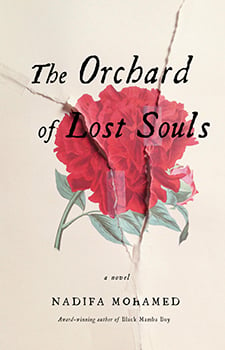A lead up to Somalia’s civil war
A review of ‘The Orchard of Lost Souls’ by Nadifa Mohamed
Share
 THE ORCHARD OF LOST SOULS
THE ORCHARD OF LOST SOULS
By Nadifa Mohamed
No war is civil, perhaps least of all those fought within a country. Mohamed’s novel opens in 1987, when Somalia is on the brink of caving in on itself. She animates the early days of anarchy through the lives of three women whose paths cross at the annual Oct. 21 celebration—commemorating the country’s military coup of 1969—in the northwest city of Hargeisa. There is Kawsar, a bereft widow in her late 50s; Filsan, a 29-year-old soldier who is eager to rise through the ranks of the country’s army; and Deqo, not a woman but a nine-year-old orphan brought to Hargeisa from a refugee camp to perform a traditional dance for a crowd of 10,000. When Deqo experiences a severe bout of stage fright, she is beaten; when Kawsar tries to intervene, she is beaten. Kawsar’s assailant is Filsan, who has just fought off the unwanted advances of her boss, Gen. Haaruun, a fictional substitute for Somalia’s former military dictator, Mohamed Siad Barre. These are the first of several unflinching episodes reflecting the kind of violence and cruelty that swept Somalia in the lead-up to the civil war that began in 1991.
In 2013, the author was named one of Britain’s best young novelists by the literary journal Granta. Here is Deqo, alone in Hargeisa after escaping her guardian from the refugee camp: “She hides behind the wide trunk of a willow near two crouched figures, her face framed in a scorched cleft where lightning has flung itself in a careless fit. She whispers her name to give herself courage. The men’s talk is distorted by the music of raindrops falling over thousands of trees in the ditch, their leaves held out like waxy green tongues.”
Mohamed skilfully exposes her characters’ souls: Kawsar’s bitter humour about a friend’s bashfulness (“They would need to make appointments to take tea like the English women used to”); Filsan’s conflicting needs for independence and approval. And though Deqo’s resilience can feel fairy-tale-like, she emerges as the story’s heart. Camping alone in an abandoned house, she watches TV for the first time. The loud voices scare her under the bed, but when the woman on the screen entreats her to “gather the family and neighbours, prepare a flask of tea, and put your cares aside,” the lonely little girl pokes her head out, answering, “OK.”
DAFNA IZENBERG